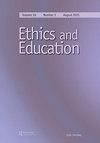Theorizing aesthetic injustice in democratic education: insights from Boal and Rancière
IF 0.7
Q3 EDUCATION & EDUCATIONAL RESEARCH
引用次数: 0
Abstract
ABSTRACT This article examines some aspects of the entanglement between aesthetic injustice and epistemic injustice, paying special attention to how aesthetic injustice can be resisted in the classroom. The article brings into conversation Boal’s notion of aesthetic injustice with Rancière’s work on the overlapping of aesthetics and politics to suggest that a truly democratic education must work on the level of senses, so that students learn how to identify and resist aesthetic injustice in their everyday lives. Specifically, it is argued that the democratic potential of education is inextricably linked to resisting aesthetic and epistemic injustice in practice. The main point of the article is that resistance to aesthetic injustice in the classroom operates as an instance of politics that mobilizes struggle against oppression. In this sense, the nature of political work conducted in democratic education is to undo the oppressive distribution of the senses.民主教育中审美不公的理论化——博阿尔和兰齐埃的见解
摘要本文探讨了审美不公正与认识不公正之间纠缠的某些方面,特别关注如何在课堂上抵制审美不公正。这篇文章将博阿尔的美学不公正概念与兰齐埃关于美学和政治重叠的工作相结合,提出真正民主的教育必须在感官层面上进行,这样学生才能学会如何在日常生活中识别和抵制美学不公正。具体而言,有人认为,教育的民主潜力与抵制实践中的审美和认识不公正密不可分。文章的主要观点是,在课堂上对审美不公正的抵制是动员反抗压迫的政治的一个例子。从这个意义上说,在民主教育中进行的政治工作的性质是消除感官的压迫性分布。
本文章由计算机程序翻译,如有差异,请以英文原文为准。
求助全文
约1分钟内获得全文
求助全文

 求助内容:
求助内容: 应助结果提醒方式:
应助结果提醒方式:


